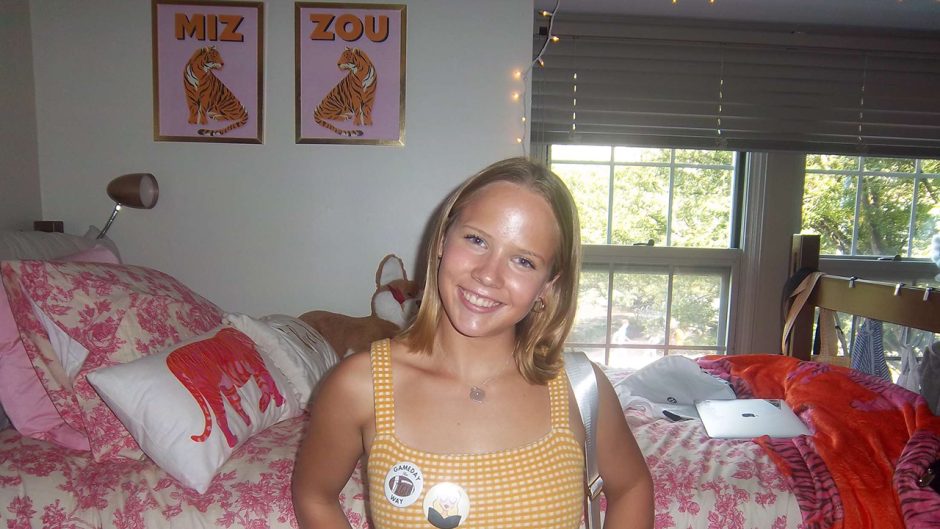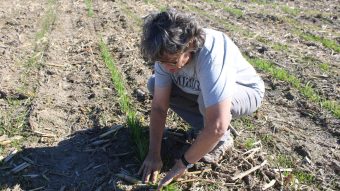
Sophomore Maggie Kissick shares how she faced her fears and embraced her first year as a Tiger.
Aug. 18, 2025
Contact: Sara Diedrich, diedrichs@missouri.edu
Photo courtesy of Maggie Kissick
When Maggie Kissick arrived at the University of Missouri last fall, the incoming freshman expected the big things — finding her classes and choosing a major — would be the hardest part. But it was the small, everyday moments that left her feeling overwhelmed.
Who would she sit with in the dining hall? Would she look clueless if she showed up to office hours? Is everyone else feeling this homesick?
What the Kansas City native discovered is that the small stuff sometimes turns out to be the best stuff or at least not nearly as scary as she thought.
“I was sad, scared and nervous at first,” she said. “But once I figured out that I had to put myself out there and take some risks, things became much less nerve-wracking for me and a lot more fun.”
Here’s how Kissick, now a sophomore majoring in journalism with an emphasis in strategic communication and a minor in business, faced her fears and embraced her first year as a Tiger.
Dine with a stranger — or two
Not long after arriving on campus, Kissick was going through sorority rush and decided to treat herself to Panda Express at the Mizzou Student Center. She planned to grab her food and retreat to the privacy of her dorm room. But at the last minute, she changed her mind.
“I told myself this was a good opportunity to stay and talk to people,” Kissick said.
Scanning the room, she spotted a table of women who appeared to also be dressed up for rush.
“I walked over, asked if I could sit with them, and they immediately said, ‘Yes.’”
They ended up chatting for about 30 minutes about recruitment, classes and college life. Afterward, Kissick thanked them and went on her way.
Did it lead to any lasting friendships? No. But for Kissick, it was a small, meaningful act of courage and a reminder that putting yourself out there is often the first step toward belonging. She also began to realize that not every interaction had to lead to a deep connection.
“At first, I was talking to so many people, having the same conversations, exchanging contact info — it all felt a bit overwhelming,” she said. “I had to learn that it’s OK if not every conversation turns into a friendship. Every interaction is still valuable as you learn to connect and build confidence.”
Once she accepted that, Kissick’s interactions became easier.
“If it turns into a friendship, that’s great,” she said, “and if not, that’s perfectly fine too.”
That ache in your chest will fade
Right after her parents dropped her off and left for home, Kissick ducked into the elevator of her residence hall and cried all the way to her floor and into her room. She wasn’t sure how she’d ever bounce back, but she did.
In the beginning, she called her mom once, sometimes twice, a day, along with other family members, just to feel connected. But as her circle of friends grew, so did her confidence in leaning on them. Gradually, her support system shifted, and she found a new sense of home.
“Homesickness comes in waves, and it doesn’t last forever,” Kissick said. “College is so much fun, and what’s funny is that I eventually felt sadder about leaving for winter break than I did about moving in. That feeling of homesickness starts to fade on its own but just remember, it’s completely normal to feel homesick.”
Take advantage of office hours
The first college class Kissick attended was Econ 1014 in Middlebush Hall. The large lecture hall wasn’t like anything she’d experienced in high school. She found the material to be tough, and Kissick quickly fell behind.
“Even though I didn’t want to admit it, I knew I needed help,” she said. “So, I went to office hours. It turned out to be one of the best decisions I made. The teaching assistants were upperclassmen who had taken the same class just a few years earlier. They were approachable, genuinely wanted to help and understood exactly where students tend to struggle.”
From that point on, Kissick made it a habit to attend office hours every week and ultimately connected with the professor.
“I was so nervous about reaching out, but looking back, it really wasn’t that scary at all,” she said. “Once I got help from her, not only did I understand the material better, but I also built a much stronger relationship with her. I just wish I had asked for help sooner. You have to be the one to speak up and the sooner you do, the better off you’ll be.”
Establish a study schedule
Early on, Kissick created a homework schedule, especially to manage what she calls “the Sunday scaries.”
“Sundays used to make me 20 times sadder, and I realized I was only making it worse by saving all my work for the end of the weekend,” she said. “Planning ahead made a big difference, and it paid off. I finished both semesters with a 4.0 GPA, but it definitely took a lot of discipline."
Kissick said another smart thing she did was find a study spot on campus.
“A lot of people wait too long, especially when it comes to places like Ellis Library, which can feel intimidating at first,” she said. “But I went my first week and ended up loving it. Don’t wait until a big test or project is looming. Find your spot, create your routine and you’ll be ready to go when it really counts.”
Take time to settle in
For Kissick, one of the best decisions she made was giving herself time to settle in during her first semester. Aside from her sorority, she gave herself time to adjust to college life, figuring out how to get up on time, make it to class, build a study routine and start forming friendships.
That foundation made all the difference.
“The first semester can be overwhelming on its own, and adding more to it , especially for overachievers like me, can be too much,” she said. “Don’t be too tough on yourself if you are doing less in college at first. Take your time when figuring out what you want to get involved with.”
Kissick kept a list of the activities she was interested in and then, once second semester began, dove in.
“By then, I had a stronger academic routine and a good group of friends, so I was able to truly commit to the things I joined,” she said. “There’s so much pressure on freshmen to get involved right away, but that’s not for everyone. Honestly, taking your time can be just as valuable. That was a big lifesaver for me.”



